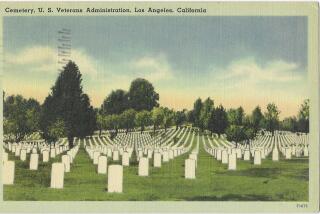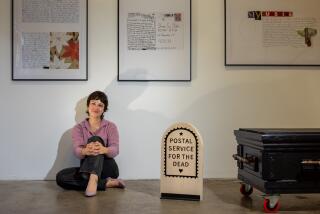Epitaphs: Humor Runs Deep; Cemeteries Don’t Dig It
In writing about the joy of epitaphs the other day I mentioned that my own would be simply: Have a nice day.
Donald G. Way accuses me of inconsistency, noting that I had previously indicated that I wished to go up in smoke; to be cremated, not buried. That’s true. I happen to be claustrophobic, and do not want to be placed in a box and buried or entombed. I’d crack up.
I see no reason, though, why a person’s epitaph can’t simply be a message he leaves, even though it isn’t engraved in stone. Perhaps mine will be included in my obituary, if any.
Louise Stocks of Claremont observes that “Have a nice day” is not very appropriate for a cemetery. “How could anyone in a cemetery (residents or visitors) do that?”
Cemeteries are in fact peaceful and pleasant places. I have enjoyed hours reading epitaphs in old English cemeteries (or graveyards, as they call them there). The grass is green; flowers blow; the countryside lies all about; the church stands nearby, quaint and sturdy. And one is secretly grateful that one is not among the great majority. I’m sure the epitaph “Have a nice day” would be appreciated.
Meanwhile, numerous readers have sent me examples of curious epitaphs they have encountered or invented. Louise Stocks sends one she composed years ago to be read as the Neptune Society scatters her ashes in the Pacific:
Over the side
Without a long speech;
Hope she goes out
And not up on the beach .
My old colleague Burt Sims has never been able to get printer’s ink out of his veins. His own epitaph reflects a common frustration of every reporter:
Burt Sims, newsman,
Frustrated again . . .
Finally got the Big Story
--And no way to phone it in . I know what he means. I still have nightmares in which I am unable to reach my paper with a big story. And, of course, Burt and I will both miss the biggest one of all--our own demise.
James E. Halferty of Pasadena says this one was found in a New England cemetery on the tombstone of a waiter who lived into very old age:
His Maker finally caught his eye .
John Gibson of Visalia recalls a classic from the famous graveyard on Boot Hill, in Tombstone, Ariz.
Here lies Lester Moore
Shot four times with a .44
No less, no more .
Bill Reed of Montebello thinks this one may be from the same site, though he can’t vouch for it:
Here lies the body of
Dear old Charlotte.
First a virgin, then a harlot.
For thirteen years she
Preserved her virginity,
Surely the record in this vicinity .
Louis Gast of Laguna Hills recalls one that might have come from the same vicinity:
Here lie the bones of Jenny Jones;
For her, life held no terrors.
Born a virgin, died a virgin,
No runs, no hits, no errors.
And evidently she broke Charlotte’s record.
Gast says that when his wife, Mary died, in 1960 he wanted to inscribe “Waiting for Louis” on her niche in a San Fernando Valley columbarium. On the next-door niche, reserved for him, he wanted to put “Late as usual.” Alas, the cemetery demurred and he had to settle for “Adored” and “Adorer.” I must remind myself, whatever I do, not to end up in that humorless place.
James F. Hurley, a senior vice president of CalFed, attributes this one to Hilaire Belloc, the French-British poet, essayist and novelist, though it could hardly have been for himself:
He died in despair,
In debt and a ditch,
The poor unfortunate
Son of a bitch .
Jean Eggen offers some she found in “The Literary Life and Other Curiosities,” by Robert Hendrickson:
Ernest Hemingway--
Pardon me for not getting up.
Robert Benchley--
This is all over my head .
George Bernard Shaw--
I knew if I stayed around long enough, something like this would happen .
Hemingway, Benchley and Shaw are certainly capable of having written those epitaphs for themselves, but, modern cemeteries being as solemn as they are, I doubt that any of them appear on their tombstones.
Steve Lane offers an epitaph written by his uncle, Ed Shoaff, for himself.
Tell the National Enquirer I’ll get in touch .
(The National Enquirer, of course, is a supermarket newspaper that is unnaturally concerned with life after death.)
First prize for the most anticlimactic epitaph is one offered for herself by Helene Burkholder of Oxnard:
“Your article on epitaphs was particularly intriguing. I spent much of the day mulling the meaning of my life. There was nothing unusual in my past. Certainly my family loved me and would miss me; my employers had always been satisfied with my work; so there was only the thought of what had been left undone. What would I regret if I were to die suddenly? Suddenly it was clear:
“I wish I had eaten more chocolate.”


